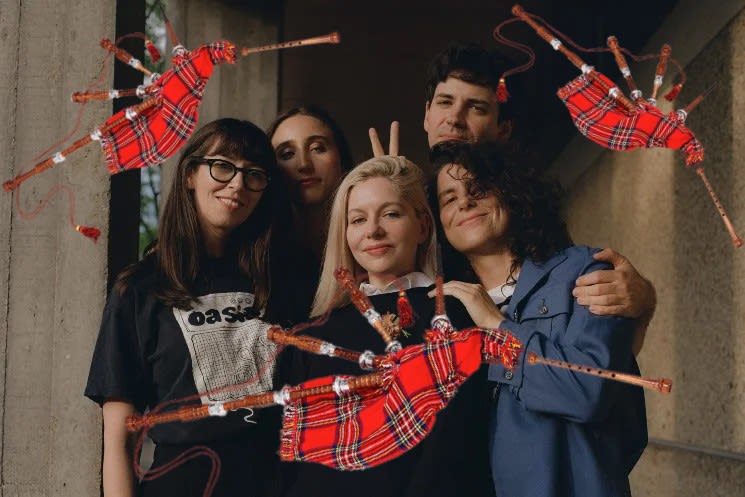Blue Rev is Exclaim!'s best album of 2022! We talked to Alvvays about how they revisited teen spirits to find a new buzz, but they've more recently opened up about drawing inspiration from perhaps an even more unlikely source than an early-aughts-era caffeinated vodka cooler: the bagpipes.
In a new instalment of their Mood Board series, Pitchfork sat down with the band's Molly Rankin, Alec O'Hanley and Kerri MacLellan to discuss the tartan-draped highland instrument's influence on their sound.
"Our whole band is like a pursuit of that droney, slightly off thing that you can't identify the constituent elements of," O'Hanley explained, "and that ends up being the capital-B bagpipe, usually."
Rankin elaborated, "Bagpipes are sort of a common instrument where we come from in Cape Breton." Turning to childhood friend MacLellan, she added, "You have several relatives who are quite Scottish that are fairly reputable pipers." And at least one of them is named Angus.
Rankin continued, "So the bagpipes are sort of like this alarm sound in my mind, but also like a beautiful, primal droning noise that you almost feel beckoned by. Part of the bagpipe thing that has sort of woven its way into our songs is the synth that we use, which is kind of central to the sound of our band." MacLellan plays a Korg synthesizer, with 60-some oscillators that she tunes by hand to make the pitches bend.
"It just feels rooted in Celtic music in a way, and any time our music is not really sounding like ours, it's usually because the Korg is not loud enough," Rankin said.
"Some people find it so goofy, and it's so painful to me," MacLellan chimed in, a crusader in the mission for bagpipes sounds to exist beyond weddings, funerals and war. Either way, as Rankin points out, they tend to be associated with pretty big moments.
Watch the full interview segment below.
In a new instalment of their Mood Board series, Pitchfork sat down with the band's Molly Rankin, Alec O'Hanley and Kerri MacLellan to discuss the tartan-draped highland instrument's influence on their sound.
"Our whole band is like a pursuit of that droney, slightly off thing that you can't identify the constituent elements of," O'Hanley explained, "and that ends up being the capital-B bagpipe, usually."
Rankin elaborated, "Bagpipes are sort of a common instrument where we come from in Cape Breton." Turning to childhood friend MacLellan, she added, "You have several relatives who are quite Scottish that are fairly reputable pipers." And at least one of them is named Angus.
Rankin continued, "So the bagpipes are sort of like this alarm sound in my mind, but also like a beautiful, primal droning noise that you almost feel beckoned by. Part of the bagpipe thing that has sort of woven its way into our songs is the synth that we use, which is kind of central to the sound of our band." MacLellan plays a Korg synthesizer, with 60-some oscillators that she tunes by hand to make the pitches bend.
"It just feels rooted in Celtic music in a way, and any time our music is not really sounding like ours, it's usually because the Korg is not loud enough," Rankin said.
"Some people find it so goofy, and it's so painful to me," MacLellan chimed in, a crusader in the mission for bagpipes sounds to exist beyond weddings, funerals and war. Either way, as Rankin points out, they tend to be associated with pretty big moments.
Watch the full interview segment below.
